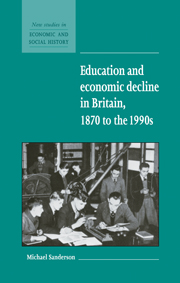Book contents
- Frontmatter
- Contents
- Acknowledgements
- Glossary and abbreviations
- Introduction
- 1 Literacy and schooling, 1870–1914
- 2 Was technical education to blame?
- 3 The counterarguments
- 4 The education of the élite, 1870–1914
- 5 Missed opportunities, 1914–1944
- 6 Post-war decline – the betrayed teenager?
- 7 Higher education and the public schools – privilege and relevance
- Conclusion
- Bibliography
- Index
- New Studies in Economic and Social History
- Studies in Economic and Social History
- Economic History Society
4 - The education of the élite, 1870–1914
Published online by Cambridge University Press: 05 June 2012
- Frontmatter
- Contents
- Acknowledgements
- Glossary and abbreviations
- Introduction
- 1 Literacy and schooling, 1870–1914
- 2 Was technical education to blame?
- 3 The counterarguments
- 4 The education of the élite, 1870–1914
- 5 Missed opportunities, 1914–1944
- 6 Post-war decline – the betrayed teenager?
- 7 Higher education and the public schools – privilege and relevance
- Conclusion
- Bibliography
- Index
- New Studies in Economic and Social History
- Studies in Economic and Social History
- Economic History Society
Summary
The education provided by the public schools and Oxford and Cambridge had long been that enjoyed by the élite, usually landed, ruling classes of Britain. During the Industrial Revolution a parallel elite emerged of industrial and commercial wealth. These were often excluded from the public schools and ancient universities by their nonconformity until such discrimination was removed in the 1850s and by the Universities' Tests Act of 1871. From the 1870s landed, ruling, professional and business élites, on the basis of their wealth from disparate origins, could share a more common school and university education. How far these schools and universities became more open to a wider élite will be examined later. This mattered because their education shaped not only the attitudes of policy makers but the types and levels of expertise brought by industrialists to their businesses and their own notions of what was adequate and appropriate for their needs.
The public schools have come in for much criticism as peculiar institutions inimical to business and industry. They have been accused of transmitting the values of the ‘Christian gentleman’, as Thomas Arnold put it, emphasising the acceptance of privilege in return for responsibilities and seeing careers in the public service, Church and professions as the best expressions of such values. Leisure was seen as worth cultivating for its own sake by gentlemen amateurs while games playing brought out co-operative team playing rather than individual endeavour.
- Type
- Chapter
- Information
- Publisher: Cambridge University PressPrint publication year: 1999



